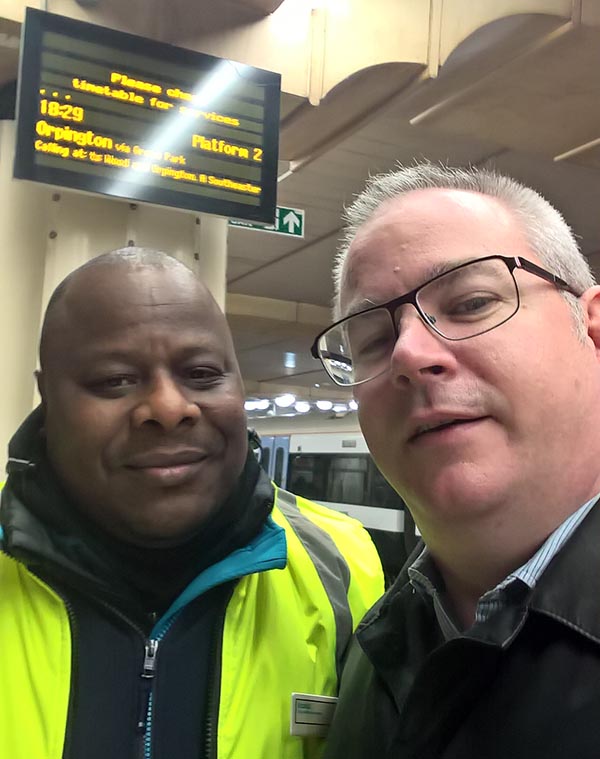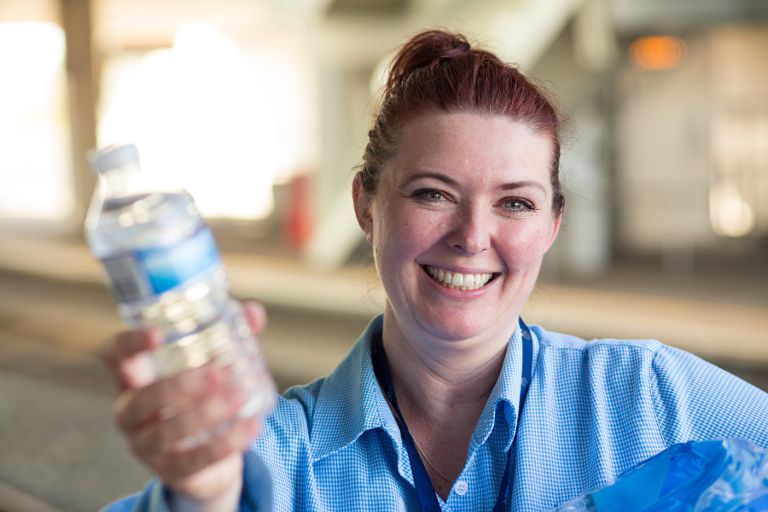My Summer - Head of Performance at Southeastern Railway, Dan Tall
Dan Tall is head of performance for Southeastern - who run trains in South East London, Kent and East Sussex.

Dan checking in with his colleague Ishmael
He’s responsible for jointly leading seasonal preparations with Network Rail to limit the impact of weather on passengers’ journeys.
Preparing for the summer heat
When the temperature soars, our rail infrastructure can be badly affected. This is because rails are made from steel and expand when they heat up. In extreme cases, this causes rails to buckle, and points can expand. Not many people know this, but metal rails in direct sunshine can be as much as 20°C hotter than air temperature, so it’s critical for my job role that we monitor and track the weather forecast.
Part of my work involves leading what we call ‘seasonal preparation.’ This involves the development of practical work plans and best practice standards for our infrastructure, as well as overseeing the communication to our passengers on how they can prepare for different weather scenarios when travelling on the rail network.
We start to plan for summer in November the year before. Our first activity is always reviewing the hot months from the previous summer to understand any lessons we can learn for the following year. By February, we’ll be working closely with Network Rail and our engineering team to identify any infrastructure problems - either on our trains or the rails themselves - that require attention before the weather heats up. Then come April, we’ll be developing our communication plan for passengers.
How does the weather affect my job?
Extreme weather conditions have a direct impact on our ability to run the rail service across London and the South East. During summer, we’re constantly monitoring sections of track that are likely to expand because of the heat, and when they get too hot we put in place speed restrictions to reduce the chance of the rails bucking.
Weather doesn’t just have an impact on our infrastructure, it also affects the environment around us. For example, in summer dry soil and track beds can weaken the embankments and cuttings that our trains run on.
In winter, even the lightest shower of rain or dusting of snow can freeze and become compacted on the rails. This insulates the electric rail and can prevent trains from drawing power or being able to move with any speed.
And it isn’t just extreme heat or cold that affect the rails; flooding, storms, strong wind and fog impact our ability to keep people moving in the most punctual and reliable way possible.
How do you check the forecast and how often?
Every day we monitor forecasts, and use tracking technology to analyse weather systems. We also look at long range forecasts so that we can ensure our train fleet and infrastructure is kept in the best possible condition to continue operating effectively.
As well as our forecasting tools, we also use technology to monitor the health of our fleet and infrastructure, identifying problems on the network such as overgrown vegetation. We also apply reflective paint to rails to keep them cooler so they expand less in hot weather. By painting a rail white, it can be kept up to 10°C cooler than would otherwise be the case.
Not only do I have a responsibility to prepare our fleets and infrastructure, but monitoring forecasts help us to ensure that colleagues are fit and healthy too. In summer, this means extra breaks and ensuring staff have frequent access to drinks, particularly those working on the platform who spend a significant amount of time outside.
Top tips for preparing to travel during the summer months
The Coronavirus pandemic continues to affect our ability to travel over the summer months. The safety of our passengers is of utmost importance and we are encouraging people to avoid travelling by train unless necessary. If you are travelling, it’s critical that people prepare for the hot weather.
 In addition to the government’s advice on the use of face coverings and regular handwashing, please also consider:
In addition to the government’s advice on the use of face coverings and regular handwashing, please also consider:
- Carrying water on your journey.
- Not boarding a train if you feel unwell.
- If you feel unwell while on-board, get off at the next stop where staff will be able to help you.
- Avoid using the emergency alarm on-board if you’re feeling unwell – we can get help to you more quickly at the next station.


